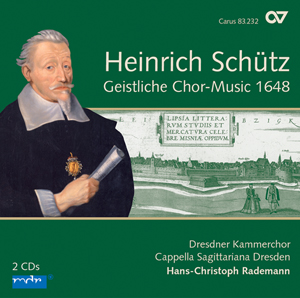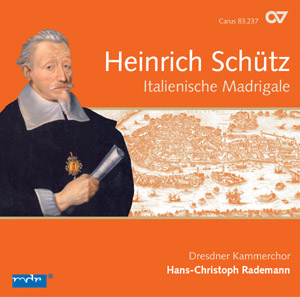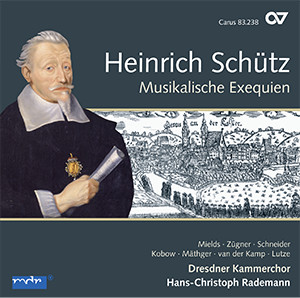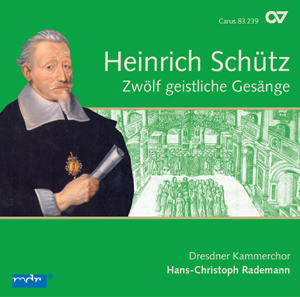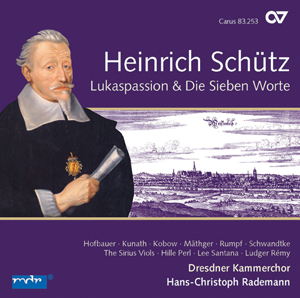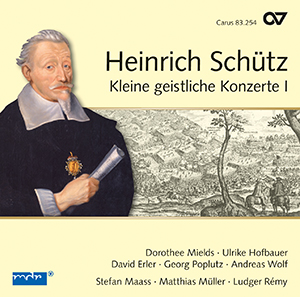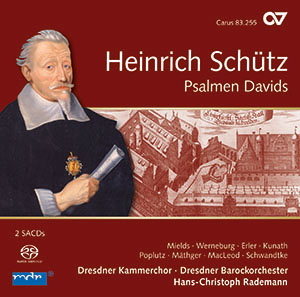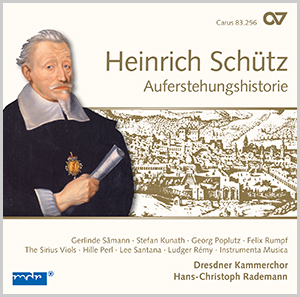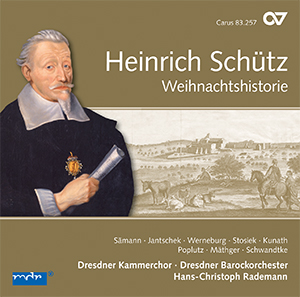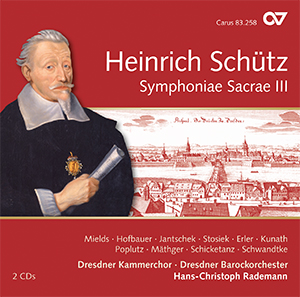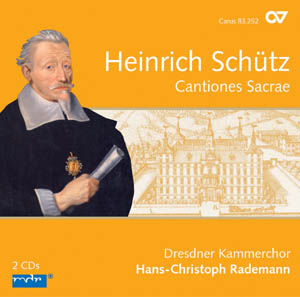
Cantiones Sacrae. Complete recording, Vol. 5 (Rademann)
Sommaire
-
Compositeur
Heinrich Schütz
| 1585-1672Heinrich Schütz is regarded as the first German musician of European stature. As a choirboy from 1599 at the court of Landgrave Moritz of Hessen-Kassel, he received a thorough education. In 1608 he began a law degree in Marburg, but broke this off in 1609 in order, with the support of the Landgrave, to study composition with Giovanni Gabrieli, organist at St Mark’s in Venice. In 1613 Schütz returned to Kassel, but two years later was enticed away by Elector Johann Georg I of Saxony to the Dresden court as “Organist und Director der Musica”, where he held the position of Hofkapellmeister (court Kapellmeister) from 1617 until his death. Schütz’s great cycles of vocal works marked the high point of his reputation in Germany and northern Europe. But these represent only part of Schütz’s output; individual works are represented in printed collections with works by other composers, others only survive in manuscript, and much has been lost. The Stuttgart Schütz Edition makes available Schütz’s complete oeuvre, and all works are also published in practical Urtext editions. Plus d'information sur la personne
-
L'auteur de l'avant-propos
Oliver Geisler
-
Chœur
Dresdner Kammerchor
Le Dresdner Kammerchor (Chœur de chambre de Dresde) – l’un des meilleurs chœurs d’Allemagne – est bien connu pour sa sonorité unique, faite d’une grande intensité et clarté. Rayonnement dynamique, homogénéité et transparence sonores souvent cités en exemple sont les points forts de cet ensemble demandé au niveau international. Le chœur a été créé en 1985 par Hans-Christoph Rademann et des étudiants du Conservatoire de musique « Carl Maria von Weber » de Dresde. De nombreuses tournées de concerts ont établi la notoriété de l’ensemble également hors d’Europe. En ont résulté des invitations régulières à d’importants festivals internationaux. Le répertoire du chœur va de la musique de la Renaissance à des compositions du 21ème siècle. Des interprétations de la musique chorale romantique et contemporaine ont été récompensées de prix spéciaux lors de concours internationaux, ainsi que du prix d’encouragement de la fondation Ernst von Siemens. En dehors de la pratique a cappella, le chœur de chambre se consacre intensément à la coopération avec le Dresdner Barockorchester et l’ensemble « Alte Musik Dresden », donnant des impulsions importantes à la pratique de la musique ancienne en Saxe. Une foule d’enregistrements pour la radio et pour le CD, ainsi que la coopération avec des orchestres allemands et étrangers viennent renforcer la renommée du Chœur de chambre de Dresde. Le CD paru aux Editions Carus de Stuttgart, avec le premier enregistrement mondial du Requiem en mi bémol majeur de Johann Adolf Hasse s’est vu décerner le prix de la Critique allemand du disque. Plus d'information sur la personne
-
Chef d'orchestre
Hans-Christoph Rademann
| 1965Conductor Hans-Christoph Rademann is an immensely versatile artist with a broad repertoire who devotes himself with equal passion and expertise both to the performance and rediscovery of early music and to the first performances and cultivation of Contemporary Music. Born in Dresden and raised in the Erzgebirge mountains, he was influenced at an early age by the great Central German kantorial and musical tradition. He was a student at the traditional Kreuzgymnasium, a member of the famous Kreuzchor, and studied choral and orchestral conducting at the Carl Maria von Weber University of Music in Dresden. During his studies, he founded the Dresdner Kammerchor and formed it into a top international choir which is still under his direction today. Since 2013, Hans-Christoph Rademann has been the academy director of the International Bach Academy Stuttgart. He regularly collaborates with leading choirs and ensembles of the international music scene. From 1999 to 2004 he was chief conductor of the NDR Choir and from 2007 to 2015 chief conductor of the RIAS Chamber Choir. Guest conducting engagements have led and continue to lead him to the Nederlandse Bachvereniging, the Collegium Vocale Gent, the Akademie für Alte Musik, the Freiburger Barockorchester, the Deutsche Radiophilharmonie Saarbrücken Kaiserslautern, the Sinfonieorchester Basel, the Orchestre Philharmonique de Luxembourg, among others. Hans-Christoph Rademann has been awarded prizes and honors for his artistic work, including the Johann Walter Plaque of the Saxon Music Council (2014), the Saxon Constitutional Medal (2008), the Sponsorship Prize as well as the Art Prize of the state capital Dresden (1994 and 2014 respectively). He received the Preis der Deutschen Schallplattenkritik several times for his numerous CD recordings (most recently in 2016), as well as the Grand Prix du Disque (2002), the Diapason d’Or (2006 & 2011), the CHOC de l’année 2011 and the Best Baroque Vocal Award 2014. In 2016 he was awarded the European Church Music Prize of the city of Schwäbisch Gmünd. His exemplary interpretation and recording of the complete works of Heinrich Schütz with the Dresdner Kammerchor in the Stuttgart Carus-Verlag, which was completed in 2019, was awarded the newly endowed Heinrich Schütz Prize as well as the OPUS KLASSIK 2020 in the same year. Hans-Christoph Rademann is professor of choral conducting at the Carl Maria von Weber University of Music in Dresden. He is also artistic director of the Musikfest Erzgebirge, ambassador of the Erzgebirge and patron of the Christian Hospice Service Dresden. Plus d'information sur la personne
-
Solist - soprano
Marie Luise Werneburg
Marie Luise Werneburg loves Renaissance and Baroque music. She grew up in a musical rectory in Dresden, and then developed her musical inclination and talent by firstly studying church music in Dresden and then later studying singing in Bremen. She is a sought-after soloist who pursues her passion for early music by singing concerts worldwide with, among others, the Ensemble Weser-Renaissance Bremen, the Lautten Compagney Berlin, the Rheinische Kantorei and Bell’Arte Salzburg. She is especially passionate about J.?S.?Bach’s cantatas and oratorios and H.?Schütz’s oeuvre. But she has also been enchanted by other musical treasures by less well-known composers such as Rosenmüller and Biber. Additionally, Werneburg’s other favorite musical projects include collaborating with the harpsichordist Elina Albach and her ensemble CONTINUUI IM, as well as with Hille Perl and the Sirius Viols. Plus d'information sur la personne
-
Solist - alto
Stefan Kunath
-
Solist - ténor
Oliver Kaden
Oliver Kaden received his early musical training in the Dresdner Kreuzchor. After passing his secondary school examinations he took lessons with Mario Hoff in Weimar before studying singing in Dresden with Piotr Bednarski. The young tenor performs with ensembles such as the Collegium Vocale Gent under Philippe Herreweghe, the Dresdner Kammerchor, Dresdner Barockorchester, musicians from the Dresden Philharmonic, and others. He has sung under conductors including Hans-Christoph Rademann, Sir Roger Norrington, Ekkehard Klemm, Ludwig Guttler, and Asher Fisch. On stage he has performed Pyramus in Pyramus and Thisbe by John Frederick Lampe at the Landesbühnen Sachsen. He has also sung Ottokar in Johann Strauss’s The Gipsy Baron and Freddy Eynsford-Hill in Lerner and Loewe’s My Fair Lady at the Mittelsachsisches Theater in Freiberg. Plus d'information sur la personne
-
Solist - basse
Felix Schwandtke
Ratio, Emotio, Physis – reason, emotion and physics – to be able to bring these three human aspects together in singing, that is the great challenge and the profound joy in Felix Schwandtke’s life. Being the son of a mathematician and an engineer, he has been shaped by analytical thinking; music provided a way for him to relate this to emotion, and to explore, with joy, the developing interaction. In the process, early music became an important catalyst, and his creative work lead him to renowned ensembles all across Europe, bringing with it many new musical encounters. Among these, the ones who have made the most impact are Hans-Christph Rademann, Ludger Rémy and Lars Ulrik Mortensen, as well as the director and Baroque dancer Milo Pablo Momm. Plus d'information sur la personne
-
Solist - orgue
Ludger Rémy
The harpsichordist/pianist and conductor Ludger Rémy († June 2017) felt an obligation to meet the challenge set by the theorist Mattheson to combine theory and practice. He studied school music and harpsichord in Freiburg, followed by private studies with Kenneth Gilbert in Paris. In 1998 he was appointed to a professorship for early music in Dresden. Around 70 CD productions – several have been awarded prestigious prizes – both as instrumentalist and conductor, as well as numerous concerts at home and abroad (at festivals incl. Utrecht, Brügge, Paris, Saintes, Bachfest Leipzig, Händelfestspiele Göttingen, Musikfestspiele Dresden) made him one of the leading musicians active in the rediscovery and revival of early German music. Plus d'information sur la personne
-
Solist - violone
Frauke Hess
Frauke Hess studied musicology in Hamburg, then began studying the gamba in 1999 with Sarah Cunningham and Hille Perl. She also attended masterclasses with J. Savall, W. Kuijken, P. Pandolfo and V. Ghielmi. Since 2000, she has been a freelancing musician, both as a soloist as well as ensemble musician, has performed on many renowned festivals with groups such as Musica Antiqua Koln, Deutsche Kammerphilharmonie, Orlando di Lasso Ensemble, Balthasar Neumann Ensemble, Freiburger Barock Consort a.o. She has made numerous CD and radio recordings. Frauke Hess was a prizewinner at the 3rd International Telemann Competition. In 2007, she graduated with distinction in the Early Music Department in Bremen with Hille Perl. Her first solo CD appeared in 2012 with works Buxtehude, Erlebach, Kuhnel, a. o. Plus d'information sur la personne
Critiques
[…] impressively sung and recorded […]
Michael Cookson, musicweb international, März 2013
Esta excelente y arrebatada versión del director Hans-Cristoph Rademann y el Dresdner Kammerchor es un buen inicio, se mire por donde se mire.
Urko Sangroniz, Diverdi, Januar 2013
L'exécution de ces Cantiones par le choer de Dresde, dirigé par Hans-Christoph Rademann, est ici aussi soignée que parfaite.
Jean Borel, l’Écho magazine, 10.01.2013
Stimmlich und klangtechnisch hervorragend ausbalanciert und glasklar intoniert bringen Hans-Christoph Rademann und sein Dresdner Kammerchor die 40 Motetten zum Leuchten […] Eine mustergültige Aufnahme - nicht nur für Liebhaber alter Musik.
concerti, Januar 2013
Dem Dresdner Kammerchor unter seinem Leiter Hans-Christoph Rademann ist es zu danken, sich dieses kompositorischen Schatzes angenommen zu haben und eine kompetente Einstudierung dieses musikalischen Meisterwerkes auf CD dokumentiert zu haben.
Singende Kirche, Dezember 2012
40 mehrstimmige Kompositionen über lateinische Schriftstellen sowie Gebets- und Meditationstexte sind prall von Expressivität und Emotion - und werden von den Protagonisten mit ebensoviel Können wie mit Herz musiziert.
Gustav Danzinger, CHOR aktuell, Dezember 2012
Der Dresdener Kammerchor besticht einmal mehr durch Reinheit und Disziplin der Gestaltung. Hört man diese Interpretationen, die ein Universum kompositorischer Einfälle feinsinnig und detailgenau ausleuchten, versteht man schwer, warum dieser Zyklus bisher kaum wahrgenommen wurde.
Karsten Blüthgen, Neue Chorzeit, Dezember 2012
Hans-Christoph Rademann bringt seinen personell immer wieder erneuerten, damit jugendlich frisch klingenden und doch nichts an sängerischer Klasse einbüßenden Dresdner Kammerchor in dieser Folge der Gesamteinspielung zu Höchstform. […] Diese zwischen Expressivität, intellektuellem Anspruch, vitalem Klangsinn und dichtem Satz balancierte Musik scheint ideal für Rademanns Formation.
Dr. Matthias Lange, klassik.com, 28. November 2012
40 mehrstimmige Kompositionen über lateinische Schriftstellen sowie Gebets- und Meditationstexte sind prall von Expressivität und Emotion - und werden von den Protagonisten mit ebensoviel Können wie mit Herz musiziert.
Gustav Danzinger, ORF - Ö1, 24. Oktober 2012
Questions fréquentes sur l'œuvre
 Il n'y a pas encore de questions et réponses concernant cette œuvre ou vous n'avez pas trouvé la réponse à votre question sur l'œuvre ? Cliquez ici et envoyez votre question spécifique à notre service clients.
Il n'y a pas encore de questions et réponses concernant cette œuvre ou vous n'avez pas trouvé la réponse à votre question sur l'œuvre ? Cliquez ici et envoyez votre question spécifique à notre service clients.




